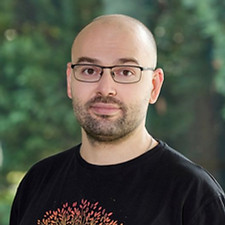Research Projects
ProxiDETECT
ProxiDETECT aims to refine the identification of molecular glues and degraders by combining advanced assay technologies and focused chemical libraries. An existing screening platform will be expanded to include further proxidrug modalities, such as compounds affecting protein-protein interactions. Key aims are to find E3 ligase binders, develop technologies to profile molecular proximity, and apply innovative imaging to study phenotypic effects of targeted protein degradation.

AltTAC
AltTAC pursues various novel approaches, such as designed ankyrin repeat proteins (DARPins), small ubiquitin-like modifier (SUMO) modification, or lysosome-targeting chimeras (LYTACs), to develop and expand the target space for proximity-inducing drugs. These approaches aim to treat diseases, including neurodegenerative disorders, by preventing aggregation, improving solubility, or clearing intracellular, membrane, and extracellular proteins.
NewPRO
The main goal of NewPRO is to expand the spectrum of E3 ligases and E3 ligase ligands that are available for PROTAC development and to develop new drugs that trigger targeted protein degradation. Novel ligands for new E3 ligases will be developed and tested within the project, supplemented by published ligands that have not yet been used for PROTAC development. Structural biology and in silico methods will support the optimization of target-selective PROTACs.

iGLUE
In iGLUE, a systematic approach will be used to identify new molecular glues (MGs) and to optimize their pharmacological properties. A previously established
MG screening platform will be used to: create next-generation immuno-modulatory drugs; develop novel cullin ring ligase-dependent degraders;
and target essential oncogenic proteins. Selected hits will then be characterized in vitro and in vivo and validated for their biological efficacy.
FaMoGLUES
FaMoGLUES aims to develop molecular glues (MGs) based on adapter proteins of the FKBP class for which the Hausch group has developed a leading ligand library. The specific goals of the project are to provide the proof-of-concept for functional targeting of so far undruggable or difficult-to-drug cancer targets and to validate FaMoGs as a new modality for herbicides. A combination of biochemical and proteomic approaches will be used to identify suitable MGs.
BioDEL
The BioDEL project aims to develop human in vitro test systems for standardized, predictive high-throughput screening of proxidrugs, with a focus on the intestine and the blood–brain barrier. Carrier platform technologies based on various prototypes will be established, and in vivo correlations (IVIVC) will be applied to create in silico models that support the rational design of proxidrugs and their carriers, unlocking the full therapeutic potential of this newly emerging drug class.

ProxiDIRECT
ProxiDIRECT focuses on developing proxidrugs with cell-specific targeting to expand their therapeutic window, reduce the non-specific distribution of active substances in the body through sink effects and thus improve the efficacy profile. Two combinable strategies will be used: The drug accumulation through intracellular targeting of proteins overexpressed in the target tissue and the localization of proxidrugs on target tissues through antibody-drug conjugates.

InnoDATA
As an umbrella project, InnoDATA is dedicated to establish FAIR (findable, accessible, interoperable, reusable) data management solutions and develop predictive tools utilizing machine learning (ML) and artificial intelligence (AI).
In addition, InnoDATA is responsible for implementing the legal and structural framework for the overall collaboration, and for advancing the innovation and technology transfer strategy and coordinating respective activities within the cluster.
ImmunoTUNE
Transcription factors hold immense, yet untapped, therapeutic potential. ImmunoTUNE aims to harness expertise in chemi-cal biology, biochemistry, genetics, and immunology to specifically manipulate FOXO transcription factors with cutting-edge technologies in proximity-inducing drugs and molecular glues. Targeted genetic manipulation of FOXOs in T-cells can control immunological functions essential for combating inflammatory, autoimmune, and malignant processes.
AntiMIC
Infectious diseases pose major challenges to healthcare systems worldwide. AntiMIC aims to establish a development pipeline for highly specific antibiotics based on proximity-inducing compounds. The project will identify and validate binders to known Legionella pneumophila effectors and develop these as warheads for PROTACs. This workflow can then be used to generate highly specific proximity-inducing compounds against other bacterial strains.

Completed Projects
ProxiTRAPS
By exploiting the proximity principle, the project ProxiTRAPS aimed to develop compounds that can be trapped specifically in cells or cell compartments (STRAPs) or highly efficiently introduced into relevant cell types (ProxiBodies). In order to achieve this, new accessory proteins as well as highly multifunctional modalities were explored. This will be instrumental to enable a context-dependent pharmacology, which allows to reduce dose-limiting side effect.
AntiDEG
In the collaborative project AntiDEG, the partners Fraunhofer ITMP, AbbVie and the Goethe University Frankfurt/Main aimed to identify and validate proximity-inducing small molecules for the specific degradation of neuronal target proteins and toxic protein aggregates for the treatment of neurodegenerative and neuroinflammatory diseases. In particular, the project applied human inducedpluripotent stem cell-derived cellular models of the central nervous system.

InnoTECH
InnoTECH developed innovative methods and technologies for identification, characterization and optimization of proximity-induced drugs and characterizes target protein profiles by utilizing genomics, proteomics and bioinformatics The project aimed to define proxidrug target molecules and reveal cellular resistance. Together with structural protein modeling, pipelines were generated that define protein-molecular interaction surfaces to guide optimization.
AntiCAN
Targeted therapies in the form of small molecule inhibitors for the treatment of cancer, sadly, have been limited in their success. Therefore, the AntiCAN project was committed to developing novel PROTACs for the treatment of cancer using modern drug design, biochemical methods and in vitro and in vivo model systems. In close cooperation with our industrial partners, it was aimed for resulting drug candidates to be introduced into clinical trial within the next few years.
Partners
AbbVie Deutschland GmbH & Co. KG
AnalytiCon Discovery – a Division of BRAIN Biotech AG
Berliner Institut für Gesundheitsforschung in der Charité (BIH)
CrystalsFirst GmbH
ENAMINE GERMANY GmbH
Fraunhofer-Gesellschaft zur Förderung der angewandten Forschung e.V.
Johann Wolfgang Goethe-Universität Frankfurt
KRAS Research GmbH
Max-Planck-Gesellschaft zur Förderung der Wissenschaften e.V.
Merck Healthcare KGaA
Merck KGaA
Revvity (Germany) GmbH
Rheinische Friedrich-Wilhelms-Universität Bonn, represented by the Universitätsklinikum Bonn
Technische Universität Darmstadt
Tetra D GmbH
Tubulis GmbH
University Medical Center of Johannes Gutenberg-University Mainz (UMC-Mainz)
Associated Partners
Bayer AG
Evolvus Technologies Pvt Ltd.
GlaxoSmithKline Research & Development Limited
House of Pharma & Healthcare e.V.
Vivlion GmbH
Steering Board

Prof. Ivan Đikić, MD, PhD
GU Frankfurt
PROXIDRUGS speaker

Prof. Dr. Volker Dötsch
GU Frankfurt

Dr. Ingo Hartung
Merck Healthcare

Prof. Dr. Gerhard Hummer
Max-Planck-Institute of Biophysics

Prof. Dr. Harald Kolmar
TU Darmstadt
![RNowak[2].png](https://static.wixstatic.com/media/078d88_c77a72879e804d70a93b6bc0540e6041~mv2.png/v1/crop/x_0,y_6,w_596,h_596/fill/w_225,h_225,al_c,q_85,usm_0.66_1.00_0.01,enc_avif,quality_auto/RNowak%5B2%5D.png)
Prof. Dr. Radosław Nowak
University of Bonn

Dr. Markus Queisser
GlaxoSmithKline

Dr. Charles Seipp
Merck

Prof. Dr. Aimo Kannt
Fraunhofer ITMP
PROXIDRUGS vice-speaker

Dr. Volker Eckelt
Revvity, Inc.

Prof. Dr. Felix Hausch
TU Darmstadt

Dr. Marc-André Kasper
Tubulis

Prof. Dr. Daniela Krause
JGU Mainz

Dr. Ole Pless
Fraunhofer ITMP

Prof. Dr. Krishnaraj Rajalingam
KRAS Research

Dr. Martin Wegner
Vivlion

Dr. Aniket Ausekar
Evolvus

Dr. Serghei Glinca
CrystalsFirst

Dr. Lars Ole Haustedt
AnalytiCon Discovery

Prof. Dr. Stefan Knapp
GU Frankfurt

Dr. Viktor Lakics
AbbVie Germany

Prof. Dr. Petr Popov
Tetra D

Dr. Otto Quintus Russe
House of Pharma & Healthcare

Prof. Dr. Maike Windbergs
GU Frankfurt

Dr. David Barber
Bayer Crop-Science

Dr. Philip Gribbon
Fraunhofer ITMP

Dr. Johanna Huchting
Fraunhofer ITMP

Dr. Kerstin Koch
GU Frankfurt

Prof. Dr. Christian Münch
GU Frankfurt

Prof. Dr. Michael Potente
BIH in der Charité

Dr. Tim Schober
ENAMINE GERMANY
PROXIDRUGS Advisory Board

Dr. Annegret de Baey-Diepolder
Science to Business Consulting

Prof. Dr. Nicolas Thomä
École polytechnique fédérale de Lausanne

Prof. Dr. Alessio Ciulli
Centre for Targeted Protein Degradation, University of Dundee

Dr. Georg Winter
AITHYRA GmbH, Wien

Dr. Timm-H. Jessen
Scienamics GmbH

Dr. Kirstin Schilling
Innovectis GmbH






